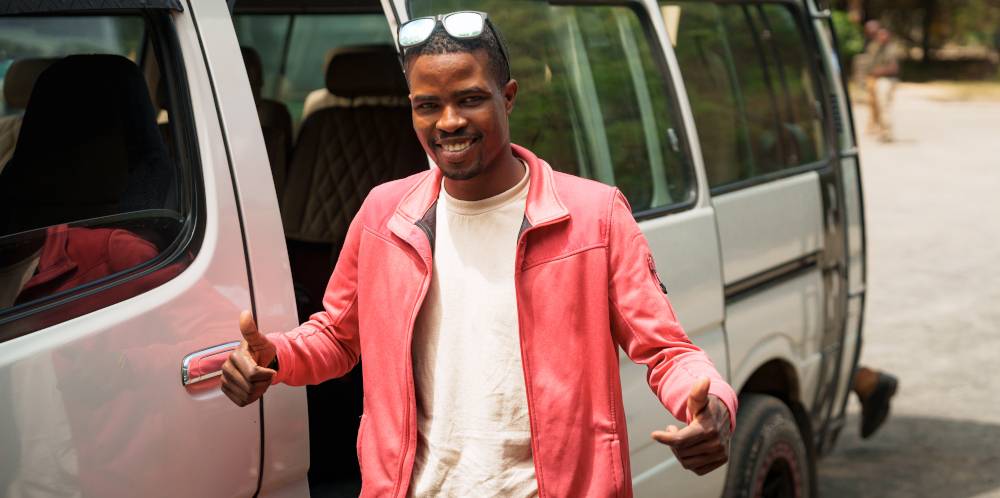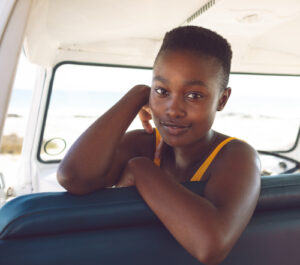
Riding Shotgun with Strangers
You don’t really plan to take an unofficial taxi. It just sort of happens. Maybe your usual minibus didn’t show up. Maybe you’re late. Maybe there’s a man leaning out of the driver’s window, index finger stabbing the air toward the direction you’re going, and the offer sounds quick, cheap, and exactly what your tired body needs. So you climb in. Passenger number two, or three, or maybe you’re the last one to make the car feel full but not quite overcrowded. A sedan designed for five now carries seven. One more human shrugging off the rules because the rhythm of the country demands flexibility.
The unofficial taxi system in South Africa doesn’t come with route maps or apps. It’s stitched together by nods, honks, open doors, and the kind of roadside trust you develop when options are limited. These are not Ubers or registered metered cabs. They are Toyotas, Nissans, and sometimes beat-up BMWs held together by habit and the driver’s stubborn will. The kind of vehicles that cough smoke when idling but somehow always make it to the destination. Almost.
Inside, the air is a strange mix of hanging pine scent, sweat, hot vinyl, and whatever song the driver is blasting through cracked speakers. Sometimes just static if the radio’s having a bad day. You sit close enough to feel someone else’s thigh against yours, close enough to know when they shift awkwardly to adjust the pressure. There’s a shared understanding that personal space is optional here. You’re all temporary roommates, riding together because the country’s public transport system leaves too many gaps.
And the thing is, these unofficial taxis aren’t just about movement, they’re entire ecosystems. The driver is also a businessman, an information broker, a self-appointed traffic analyst, and sometimes, a preacher. He talks to everyone. Asks where you’re headed. Asks where you’re coming from. Might even ask if you believe in Jesus or why you think Bafana Bafana still hasn’t sorted out its midfield. You answer, or you don’t. But the conversation continues with or without you.
The seats have stories. Some of them hold daily commuters, students on their way to campus, mothers with heavy bags of fruit, or workers returning home after a long shift. Others hold strangers who will become something more by the end of the ride, brief comrades in a journey made surreal by the closeness and the chaos. And always, there’s that one guy who thinks he should be driving, offering unsolicited advice from the passenger seat with the confidence of someone who’s definitely crashed a car before.
 There’s no ticket. No insurance. Sometimes not even a seatbelt. But there’s rhythm. There’s logic in the madness. The front passenger manages the money. Coins clink into his hands and notes get folded tightly into a small stash under the gear lever. The pricing isn’t printed, but you somehow always know what to pay. It’s built into muscle memory and whispered consensus.
There’s no ticket. No insurance. Sometimes not even a seatbelt. But there’s rhythm. There’s logic in the madness. The front passenger manages the money. Coins clink into his hands and notes get folded tightly into a small stash under the gear lever. The pricing isn’t printed, but you somehow always know what to pay. It’s built into muscle memory and whispered consensus.
Of course, it’s not perfect. There’s risk. The cars are often unroadworthy. There are horror stories. Accidents. Arguments. The occasional scammer who takes your fare and disappears before the engine turns. And still, the system persists. Because for many, there’s no alternative. For every township, peri-urban sprawl, or under-serviced suburb, the unofficial taxi is a lifeline. It’s infrastructure born from absence, grown in cracks.
And it tells you something about the country, doesn’t it? That in the vacuum of reliability, people still find a way to move forward. That when systems fail, citizens improvise. The unofficial taxi isn’t just a vehicle, it’s a metaphor. For South African resilience. For making plans when there’s no plan. For trusting strangers because you have to. Because if you don’t get to work, you don’t get paid. If you don’t get to the clinic, the appointment is gone. If you don’t get to school, you fall behind.
Sometimes, in the middle of a dusty ride along a potholed road, you’ll look around the car and realize there’s a strange intimacy in sharing space with strangers. You’re all heading somewhere. And for a moment, you belong to the same direction. The same unspoken agreement that we all just need to get through today. Then someone taps the roof and says “Next stop,” and the car slows down. A quick “Thanks, driver,” a shuffle out the door, and another person slides into the space. The journey continues. One ride at a time.
By the time you arrive, you don’t remember the registration plate. You might not even remember the driver’s name, if he gave it. But you remember the feeling. Of heat. Of movement. Of people making it work despite everything. Because in South Africa, that’s the true commute. Less about the road and more about who you travel with.
And sometimes, riding shotgun with strangers is the only way to remember that this country, for all its divisions and dysfunctions, is still moving forward. Even if the handbrake squeaks and the door needs to be kicked open to close.




